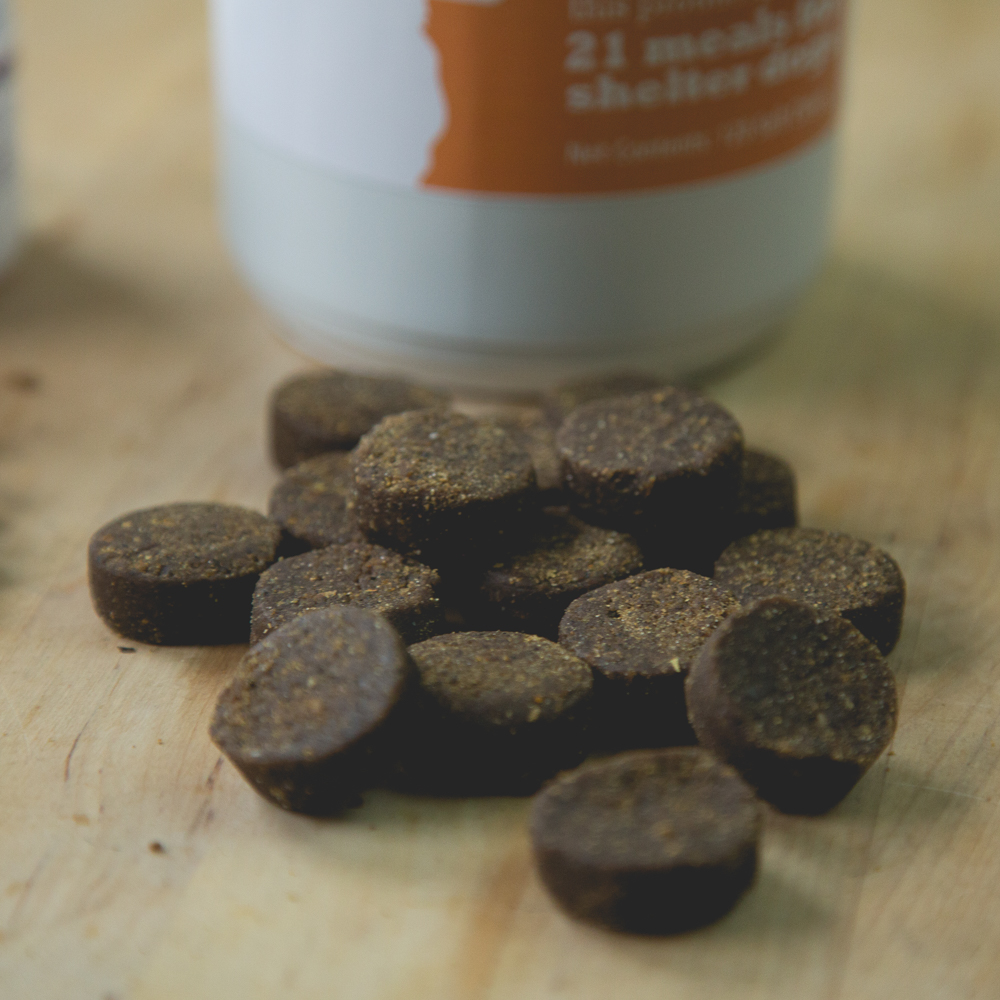If your dachshund has allergies, you know how painful it can be. Not just for your pup, but for you as well. It’s difficult to see your companion suffer through testing, pain and potentially life-threatening allergic reactions.
Determining what your dog is allergic to can be a long and difficult process, and some allergies may be mild and go undiagnosed. However, if your dog has severe or even moderate allergies, you know the challenges faced trying to keep your dog healthy and happy.

Common Allergens for Dachshunds
- Pollen
- Grass
- Food (such as wheat, chicken or soy)
- Medications (penicillin, opiates, etc.)
- Perfumes
- Shampoos and other cleaning products
- Latex
Allergies are a hypersensitive and damaging response of the immune system to external allergens, such as pollen and food. It’s the same for humans and dogs. However, with dogs the signs and symptoms may go unnoticed because our furry friends can’t tell us what’s wrong. So as the leader of the pack, we need to be hyperaware of what to look out for.
Related: Best Allergy Supplements To Give a Dog

Common Allergy Signs & Symptoms in Dachshunds
- Dry, itchy skin (possible scabs or sores)
- Excessive scratching, biting or licking on skin
- Watery eyes
- Paw chewing
- Nasal discharge
- Chronic ear infections
- Diarrhea
- Vomiting
- Sneezing
- Breathing issues (very serious sign!)
Fortunately, there are ways to help boost your dog’s immune system and decrease the effects of allergies. Omega fatty acids are a major benefit in the fight against allergies and degenerative disorders that can cause inflammation and arthritis. Some research has shown that Omega’s can even prevent allergies from developing in puppies. While every dog is different, there is no argument that your pup could benefit from Omega fatty acids. But here’s the catch…dogs can’t produce Omega’s on their own, so they must get them somewhere else.
The Problem: Dogs Can’t Produce Vital Omega Fatty Acids
There are many sources of essential Omega fatty acids. Some mistakenly believe that dog food delivers all your dog needs. Unfortunately, because Omega’s are susceptible to heat, most of the benefits become biologically unavailable to your dog due to the cooking/treatment temperatures of dog food.
That’s why I personally give my dog an Omega supplement. They really seem to like the Omega-3 Select chews from Project Paws. I like them because they’re made from anchovies and krill, which have some of the highest concentrations of Omega’s of any fish. Because these are small fish with a shorter lifespan, they don’t contain the high level of toxins like other large fish like Salmon. The other reason I love them is because each purchase of Omega-3 Select chews provides meals for up to 21 shelter dogs.
It’s important to remember that this is a marathon, not a sprint. It may takes weeks or even several months for your dog to feel the benefits of an Omega supplement. Talk to your vet, and find out if Omega fatty acid supplementation might be a part of an holistic plan to support your dachshund’s immune system and fight allergies.
Top 9 Pet Insurance Plans for Dachshunds (2022)
- Best Joint Supplement for Dogs
- Best CBD Gummies for Dogs
- Goat's Milk for Dogs
- Skin & Coat Supplements for Dogs
- Weight Gain Supplements for Dogs
- Muscle Building Supplements for Dogs
- Heart Supplements for Dogs
- Multivitamins for Dogs
- Pill Pockets for Dogs
- Digestive Enzymes for Dogs
- Turmeric for Dogs
- Liver Supplements for Dogs
- Tear Stain Supplement for Dogs
- Breath Fresheners for Dogs
- Kidney, Urinary, & Bladder Supplements for Dogs
- Stool Eating Deterrent for Dogs
- Eye Supplements for Dogs
- Melatonin for Dogs
- Apple Cider Vinegar for Dogs
- Green Lipped Mussels for Dogs
- L Theanine for Dogs
- Chondroitin Supplements for Dogs
- MSM for Dogs
- Valerian Root for Dogs
- Chamomile for Dogs
- Boswellia for Dogs
- L Tryptophan for Dogs
- Yucca for Dogs
- Licorice Root for Dogs
- Bromelain for Dogs
- Papain for Dogs
- Devil's Claw for Dogs
- Quercetin for Dogs
- Hemp gummy for dogs
- Best Hemp Dog Treats
- Best Hemp Oil for Dogs
- Best Calming Treats, Chews, & Supplements for Dogs
- Best Bone Broth for Dogs
- Best Fish Oil for Dogs
- Best Probiotics for Dogs
- Best Hip Dysplasia Supplements for Dogs
- Best Colostrum for Dogs
- Best Quercetin for Dogs
- Best Greens for Dogs Supplements
- Best Vitamin C Supplements for Dogs
- Best Probiotic for Dog with Allergies
- Best Taurine Supplements for Dogs
- Best Dog Food Toppers
- Best Anal Gland Supplement for Dogs
- Best Dog Probiotic Powder
- Best CoQ10 Supplement for Dogs
- Best Liquid Glucosamine for Dogs
- Best Wrinkle Creams, Balms, and Wipes for Dogs
- Best Puppy Calming Treats
- Best Colloidal Silver for Dogs
- Best Adaptogen Supplements for Dogs
- Best Cognitive Supplements for Dogs
- Best Bee Pollen for Dogs
- Best Vitamin A Supplements for Dogs
- Best Vitamin E Supplements for
- Best Liquid Glucosamine Supplements for Dogs
- Best SAM-e Supplements for Dogs
- Best Hyaluronic Acid Supplements for Dogs
- Best Apple Cider Vinegar Supplements for Dogs
- Best Diarrhea Medicine for Dogs
- Best Milk Thistle for Dogs
- Best Turkey Tail Mushroom Supplements for Dogs
- Best Astaxanthin Supplements for Dogs
- Best Lutein Supplements for Dogs
- Best Electrolyte Supplements for Dogs
- Best Coconut Oil for Dogs
- Best Prenatal Vitamins for Dogs
- Best Puppy Milk Replacements
- Best Iron Supplements for Dogs
- Best Dewormer Products for Dogs
- Best Mange Medications for Dogs
- Best Cough Relief Products for Dogs
- Best Sinus Relief Products for Dogs
- Best Collapsed Trachea Supplements for Dogs
- Best Fireworks Anxiety Relief Products for Dogs
- Best Thunderstorm Anxiety Relief Products for Dogs
- Best Travel Anxiety Relief Product for Dogs
- Best Supplements for a Dog with a Torn ACL
- Best Supplements for a Dog with Patellar Luxation
- Best Supplements for a Dog with Intervertebral Disc Disease
- Best Zinc Supplements for Dogs
- Best Biotin Supplements for Dogs
- Best Tart Cherry Supplements for Dogs
- Best Resveratrol Supplements for Dogs
- Best Ginkgo Biloba Supplements for Dogs
- Best Ashwagandha Supplements for Dogs
- Best Supplements for Dogs with Cushing's Disease
- Best Adrenal Supplements for Dogs
- Best NAD+ Supplements for Dogs
- Best NMN Supplements for Dogs
- Best Supplements for Dogs with Dementia
- Best Supplements for Dogs with CCD(Canine Cognitive Dysfunction)
- Best Fiber Supplements for Dogs
- Best Spirulina for Dogs
- Best Hairball Remedies for Dogs
- Best Eye Drops for Dogs with Allergies
- Best Magnesium Supplements for Dogs
- Best Brushes for Double-Coated Dogs
- Best Dandelion Root Supplements for Dogs
- Best Probiotic for Dogs with Yeast Infections
- Best Flaxseed Oil for Dogs
- Best Chamomile Supplements for Dogs
- Best Lavender Supplements. Treats & Sprays for Dogs
- Best Collagen Supplements for Dogs
- Best Kelp Supplements for Dogs
- Best Activated Charcoal for Dogs
- Best Slippery Elm Supplements for Dogs
- Best Supplements for Dogs with Seizures & Epilepsy
- Best Antioxidant Supplements for Dogs
- Best Ubiquinol Supplements for Dogs
- Best Hormone & Glandular Supplements for Dogs
- Best Thyroid Supplements for Dogs
- Best Iodine Supplements for Dogs
- Best Dog Shedding Supplements for Dogs
- Best Detox Supplements for Dogs
- Best Postbiotics for Dogs
- Best Aspirin Products for Dogs
- Best Dog Anti-Nausea Products
- Best Dog Mouthwashes
- Best Camelina Oils for Dogs
- Best Hemp Seed Oils for Dogs
- Best Natural Anti-Inflammatories for Dogs
- Best Cancer Supplements for Dogs
- Best Sardine & Anchovy Oils for Dogs
- Best Fatty Acid Supplements for Dogs
- Best Chia Seed Supplements & Treats for Dogs
- Best Olive Oils for Dogs
- Best Amino Acid Supplements for Dogs
- Best Moringa Supplements for Dogs
- Best Echinacea Supplements for Dogs
- Best Cranberry Supplements for Dogs
- Best D-Mannose Supplements for Dogs
- Best Nettle Leaf Supplements for Dogs
- Best Marshmallow Root Supplements for Dogs
- Best Astragalus Supplements for Dogs
- Best Pumpkin Seed Supplement for Dogs
- Best Supplements for a Dog Wetting The Bed
- Best Blueberry Supplement for Dogs
- Best Bromelain Supplements for Dogs
- Best Yucca Supplements for Dogs
- Best Ginger Supplements for Dogs
- Best Rosehip Supplements for Dogs
- Best Allergy Medicines for Dogs
- Best Reishi Mushroom Supplement for Dogs
- Best Maitake Mushroom Supplement for Dogs
- Best Chaga Mushroom Supplement for Dogs
- Best Shiitake Mushroom Supplement for Dogs
- Best Cordyceps Mushroom Supplement for Dogs
- Best Lion's Maine Supplement for Dogs
- Have question? - Ask in our Dog Health Forum
- CBD for Dachshunds: What You Need to Know
- Best Supplements for a Senior Dachshund
- Best Flea & Tick Products for Dachshunds
- Best Dog Foods for Dachshunds
- Best Online Dog Training Courses for Dachshund
- Best Hip & Joint Supplement for a Dachshund
- What Supplements Should I Give a Dachshund Puppy?
- The 9 Best Dachshund Puppy Foods
- Best Dog Beds for Dachshunds
- Improve Your Dachshund's Skin & Coat with This One Hack
- Giving This to Your Dachshund Daily Can Alleviate Itchy Allergies
- 6 Natural Ingredients to Fight Your Dachshund's Allergies
- 8 Ways to Stop Your Dachshund's Scratching
- 7 Ways to Calm Your Dachshund's Anxiety
- 6 Remedies for Your Dachshund's Diarrhea, Gas, or Vomiting
- 7 Best Dental Chews for a Dachshund

 Toledo, United States.
Toledo, United States.